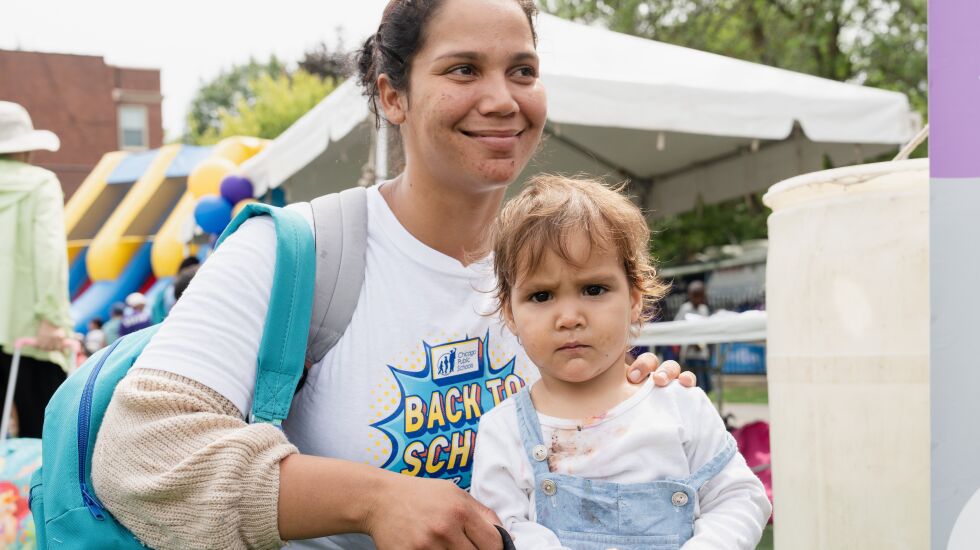
Holding a mess of melting popsicle, Carlos Gabriel, a recent Venezuelan immigrant, appeared as tousled and revelrous as the next 8-year-old, but when asked about the upcoming school year, his mind wandered.
“Math, science,” he said, listing the subjects he was most looking forward to, before asking his mom if he could go climb the bounce house.
Genesis Yovera let her eldest go and smiled.
“It’s been a long, long time” since her boys were in school, she said, and she knew immigrating effectively canceled out her accounting degree, but she took solace that her love of numbers hadn’t been lost in the equation.
“It’s a great opportunity that they’re offering us here” said Yovera, 30, looking at the North Side back-to-school event going on around them.

Thousands of families like Yovera’s have arrived in Chicago in the past year. Many have had a hard time, sleeping on police station floors as the city scrambled to find housing and been subjected to protests by Chicagoans who didn’t want them in their neighborhoods.
But Friday’s event was a chance to welcome them and prepare them to be productive CPS students.
Three buses, carrying dozens of children from nearby shelters were brought to the event at Eugene Field Elementary School in Rogers Park, which was for Network 2 CPS schools, said Estuardo Mazin, chief of schools.
“We’re committed to making sure that our migrant students make sure that they feel they’re part of the community,” he said.
Students at the event had a chance to meet faculty, pick up school supplies and meet other CPS families. CPS did not allow a reporter to speak with other Network 2 staff at the event.
CPS said this was the only back-to-school event they had brought migrant children staying in shelters to.
Over 12,000 immigrants have arrived in Chicago since August, 2022. 6,128 are in city shelters, over a quarter of whom are minors. Most shelters are reserved for families.
At the event Friday, kids munched on free popcorn, picked up free books and shimmied to a live DJ, playing everything from the Bee Gees to Beyonce.
“It’s been hard, but this is a nice moment,” said Rosalin Nuñez, a mother of four from Venezuela, steering around her youngest. “It’s a big happiness for us.”
Nuñez was looking forward to having her three older kids in school again. She said they already had picked up some English and anticipated that being surrounded by English-speaking classmates would help them learn that much faster.
She couldn’t remember the name of the school where her kids would be going but had heard some of the teachers spoke Spanish.

Cesar Argenis arrived from Venezeula with his family before the end of last school year, and he and his sister were among the many immigrant children that joined CPS before the year was up.
Cesar, 13, and his sister, 10, attended Field. His sister had a Spanish-speaking teacher, but his teachers spoke “purely English,” he said, sighing and raising his eyebrows, as if he were recalling running a marathon with one shoe.
It was better than no classes.
“The education system’s gotten worse, totally worse,” said Cesar’s mother. “In fact, there’s not really any classes.”
The education system has been highly disrupted as many teachers have quit or gone on strike as the cost of living has vastly outpaced wage growth.

This year the pair of siblings were assured that their new school would have ample help for Spanish speakers and, as during the long road here, they’d be together.
“It’s better like that,” Cesar said, “than to be separated.”

Michael Loria is a staff reporter at the Chicago Sun-Times via Report for America, a not-for-profit journalism program that aims to bolster the paper’s coverage of communities on the South Side and West Side.







